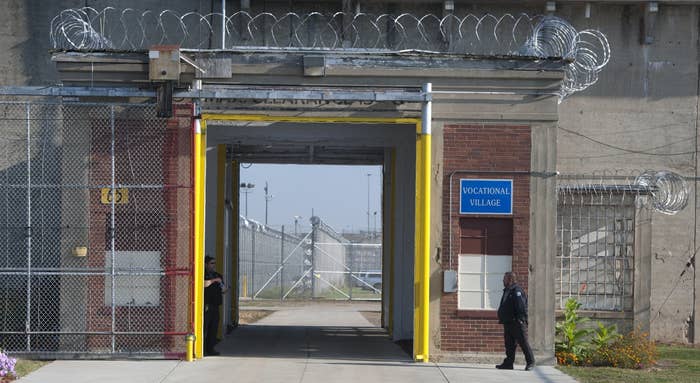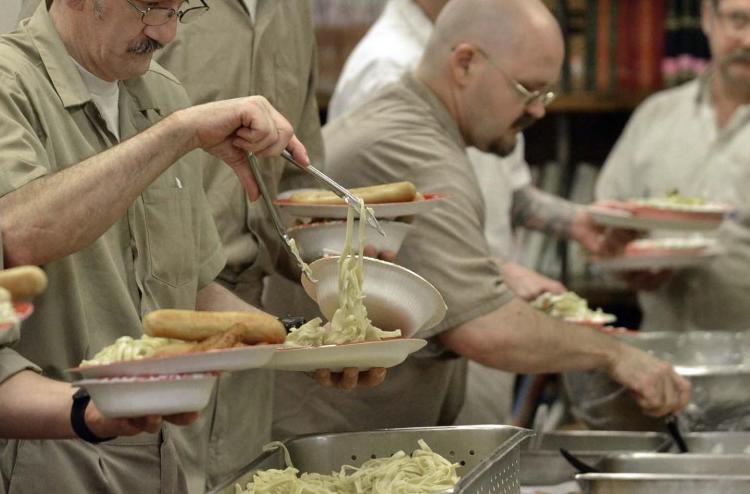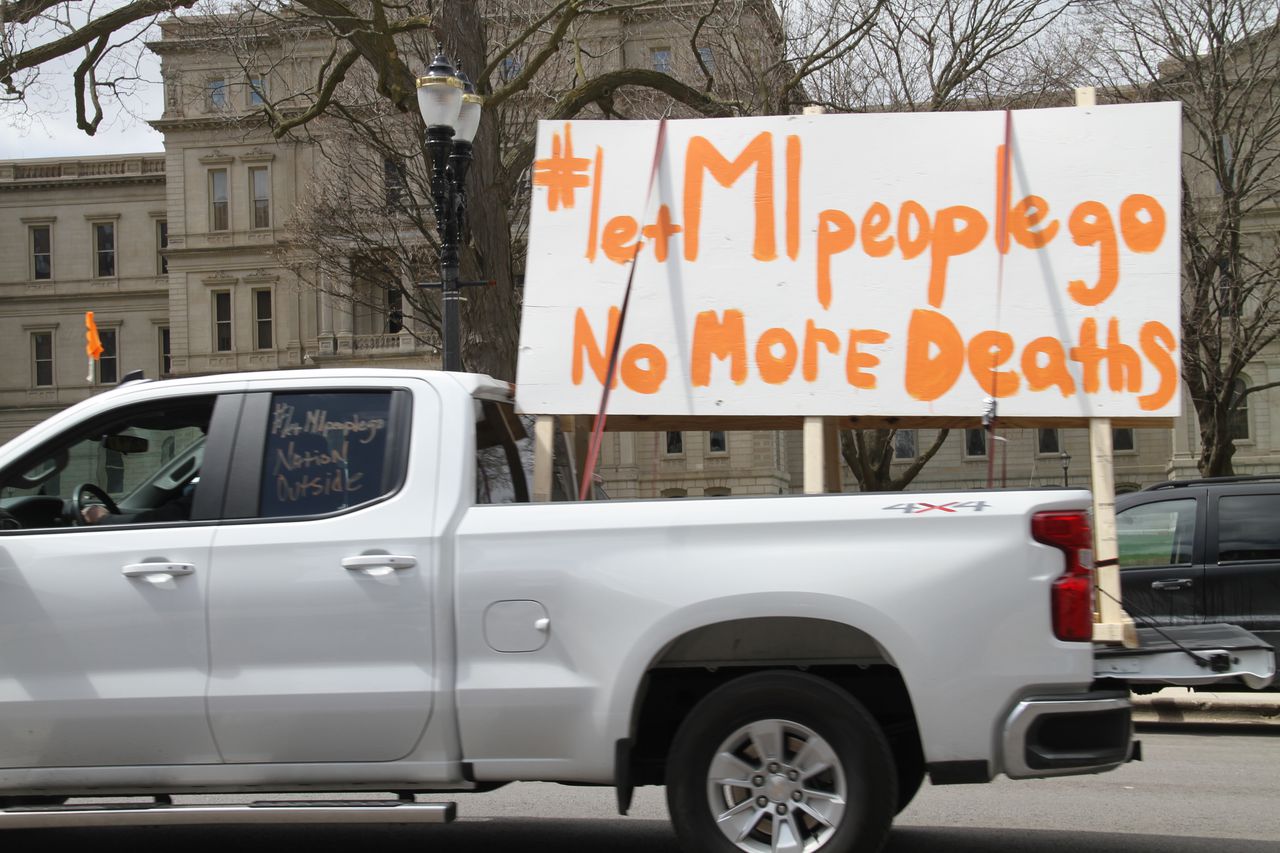Car Caravan fills streets outside Michigan Capitol, calls on Gov. Whitmer to release prisoners endangered by COVID-19
Parnall Correctional Facility in Jackson, MI has over400 cases, higher than Cook County Jail, Rikers Island, USS Theodore Roosevelt sailors

Parnall Correctional Facility in Jackson, MI
By Malachi Barrett | mbarret1@mlive.com
April 16, 2020
A caravan of protesters circled Michigan’s Capitol for the second day in a row to protest Gov. Gretchen Whitmer’s handling of the coronavirus pandemic, this time calling her to increase protections for incarcerated residents.
Protesters in roughly 50 vehicles organized by prison reform group Nation Outside (https://www.nationoutside.org/) drove outside the Capitol while leaders of the protest communicated their message to supporters through an online broadcast.
Troy Rienstra, a board member and outreach director for Nation Outside, said the group is asking Whitmer to implement a series of measures to protect staff and prisoners facing the risk of exposure to COVID-19 in state prisons. The first Michigan prison inmate died from the coronavirus on April 4, and the state health department since reported 10 inmates and two staff have died and 472 tested positive for the infectious respiratory disease.
End ‘Truth in Sentencing,” release prisoners on good behavior
Demonstrators called on the governor to suspend Michigan’s Truth in Sentencing Law, which requires MDOC inmates to serve their entire minimum sentence before being considered for parole. Suspending the law could release of 3,000 to 5,000 people who demonstrate good behavior, organizers said.
“We want to make sure that people are taken care of and for those that can be released, that the government would do that expeditiously,” Rienstra said. “It’s not only an act of mercy, but it’s an act of wisdom. They can do it today if they wanted to.”
Protesters want emergency commutations, expedited parole process
Protesters also advocated for Whitmer to grant emergency special commutations, waive the two-year requirement between filing for commutation, expedite the parole process and convene a task force to evaluate other emergency measures. Rienstra said he also wants to expand testing of inmates who are reluctant to report their symptoms.
“We want to address the needs and concerns of both sides because only addressing one can drive a wedge between the two,” Rinestra said. “We’re really concerned about the quiet within the population because that is a signal that there’s potential trouble on the rise.”
Prisons and jails across the country have become COVID-19 hotspots, prompting a $2 billion federal program to fund coronavirus testing and early-release efforts in state prisons and county or local jails. Reinstra said the state should prioritize the early release of non-violent offenders who are close to serving their sentences.

Slop for dinner at Kinross Prison; Efren Paredes Jr., who is at Lakeland Correctional Facility, is calling for meals to be delivered to prisoners to stop spread of COVID-19 in prison chow halls.
Coronavirus quarantine areas have been created in each of the state’s 29 prisons, and the department is working to expand testing and provide more protective masks to inmates and prisoners. MDOC spokesman Chris Gautz said the state took action before the first case was confirmed on March 10 by ramping up the production of cleaning supplies and implementing various other measures.
A few examples Gautz highlighted include restricting movement at prisons experiencing an outbreak, reducing the size of educational classes and the number of inmates served meals at one time, restricting group fitness activities and increasing sanitation practices.
To minimize the infection risk inside Michigan jails, Gov. Gretchen Whitmer issued an executive order on March 29 allowing counties greater flexibility to release prisoners early. The order also requires screening of all people arriving or departing at corrections facilities, restricts visitations and suspended transfers into state prisons.
________________________________________________________
 Reporter Curt Guyette, with Michigan’s ACLU, interviewed prisoners at Muskegon Correctional Facility, who reported a drastic lack of sufficient soap for hand-washing and other cleaning needs. Story excerpt:
Reporter Curt Guyette, with Michigan’s ACLU, interviewed prisoners at Muskegon Correctional Facility, who reported a drastic lack of sufficient soap for hand-washing and other cleaning needs. Story excerpt:

Quentin X Betty, MDOC photo
Despite the desperate need for soap to combat the spread of COVID-19, the MDOC has not increased its weekly ration of two hotel-sized bars, even as the department is urging inmates to wash their hands frequently to protect themselves and others from the virus.
Along with using that soap to hand-wash and shower, some are also using hot soapy water to clean surfaces within their cells. Given all that, those locked up say two small bars do not last much more than a day. Contrary to MDOC policy, when the soap inevitably runs out before the week is up, it is not replaced for free. If individuals have money in their prison account, they can purchase soap from the commissary. Those without money are left to fend for themselves.
“We are told to frequently wash our hands, and we need to do all the other things we do with it, so when we ask for more soap, no soap is provided,” said Quentin X Betty, who has been housed at Muskegon for just more than a year and serves as the lead representative on the “Warden’s Forum,” a monthly meeting he and others locked up have with the facility’s top officials.
Mr. Betty said the routine has been to receive two rolls of toilet paper and two hotel-sized bars of soap a week. The soap can be used for everything from showering to washing dishes and to cleaning clothes. But soap is definitely running out during this pandemic, he added.
_______________________________________________________

Lansing car caravan demands “Let MI people go”
Reinstra, who served 22 years in jail for an armed robbery conviction before starting a new life as a prison reform activist, expressed optimism that Whitmer and other state officials will be open to the group’s demands. He said activists want to “extend an olive branch” to MDOC officials and start a dialogue with lawmakers.
Ben Roussel, a spokesperson for the event, said organizers wanted to present a stark contrast between their rally and the “Operation Gridlock” rally. Thursday’s event was meant to emulate a funeral procession in observance of inmates who have died, and protesters displayed orange flags with a black cross from their vehicle windows.
Reinstra said protesters were advised to stay in their vehicles and fill their gas tank in their hometown to prevent the spread of the coronavirus.
Protesters didn’t go easy on the governor, claiming her administration has demonstrated “gross neglect of the state’s prison population” in a release. Several vehicles at the protest carried statements like “Gov. Whitmer has power of life and death in her hands,” “prisons are public health disasters” and #LetMIPeopleGo, a social media campaign that spread across Twitter this week.
.@GovWhitmer reminded us that we MUST take aggressive measures to #StopTheSpread and this should extend to state prisons @MichiganDOC. Now is the time to begin a robust effort to process and expedite commutations. #LetMIPeopleGo #ClemencyCoastToCoast @LtGovGilchrist pic.twitter.com/sM9McNixoV
— Detroit Justice Center (@justcitydetroit) April 14, 2020
Demonstrators said incarcerated people are reporting dangerous conditions inside state prisons, including an inability to observe social distancing due to overcrowding, a shortage of cleaning supplies and a failure to quarantine sick inmates.
Gautz said it’s impossible to maintain social distancing in congregate settings 100% of the time, but Whitmer’s orders have ensured prisons aren’t at capacity. He said 700 to 900 inmates are released on parole each month, while no new inmates are coming into state facilities.
“Our prisons are not overcrowded, especially right now,” he said.
The American Civil Liberties Union of Michigan is also urging Whitmer to release elderly and medically vulnerable people from state prisons. The organization began running television ads in Lansing to spread that message.
“Governor Whitmer knows that reducing the number of people locked behind bars is critical to stopping the spread of COVID-19, and she took a bold and necessary step to release vulnerable people in jails,” said Dave Noble, Executive Director of the ACLU of Michigan. “But 40,000 people sitting in state prisons, as well as prison staff, their families, and communities, face the same threats, and their lives are just as important. She can save lives by acting now, but these disturbing reports prove that time is running out.”
The ACLU also highlighted the disproportionate impact of COVID-19 on African Americans in Michigan, who make up 40% of COVID-19 deaths, but only 14% of the state population. Decades of “unresolved systemic racism” caused people of color to be incarcerated and face a higher risk of infection, the organization said.
#StopCOVIDGenocideinPrisonsandJails, #EndMassIncarceration, #LetMIPeopleGo
Related:
Nation Outside is calling on supporters to sign petition to Gov. Whitmer at https://actionnetwork.org/letters/demanding-action-now-covid-19-and-michigan-prisons?delivery_id=44376929
LIFER EFREN PAREDES, JR. REPORTS ON COVID-19 IN MDOC; PRISONERS IN GRAVE DANGER WORLD-WIDE
More:
MLIVE Michigan inmates hide coronavirus symptoms to avoid prison quarantine
https://www.aclumich.org/en/news/unprotected-prison-pleas-help-inside




